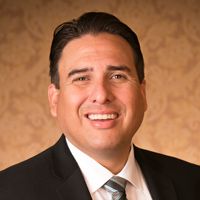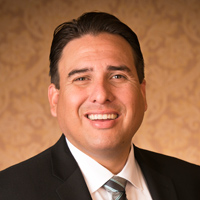Use Today’s Tax Overhaul to Invest in Tomorrow
Here's a roundup of what is changing for 2018, and how you can make the most of your potential savings.


Profit and prosper with the best of Kiplinger's advice on investing, taxes, retirement, personal finance and much more. Delivered daily. Enter your email in the box and click Sign Me Up.
You are now subscribed
Your newsletter sign-up was successful
Want to add more newsletters?

Delivered daily
Kiplinger Today
Profit and prosper with the best of Kiplinger's advice on investing, taxes, retirement, personal finance and much more delivered daily. Smart money moves start here.

Sent five days a week
Kiplinger A Step Ahead
Get practical help to make better financial decisions in your everyday life, from spending to savings on top deals.

Delivered daily
Kiplinger Closing Bell
Get today's biggest financial and investing headlines delivered to your inbox every day the U.S. stock market is open.

Sent twice a week
Kiplinger Adviser Intel
Financial pros across the country share best practices and fresh tactics to preserve and grow your wealth.

Delivered weekly
Kiplinger Tax Tips
Trim your federal and state tax bills with practical tax-planning and tax-cutting strategies.

Sent twice a week
Kiplinger Retirement Tips
Your twice-a-week guide to planning and enjoying a financially secure and richly rewarding retirement

Sent bimonthly.
Kiplinger Adviser Angle
Insights for advisers, wealth managers and other financial professionals.

Sent twice a week
Kiplinger Investing Weekly
Your twice-a-week roundup of promising stocks, funds, companies and industries you should consider, ones you should avoid, and why.

Sent weekly for six weeks
Kiplinger Invest for Retirement
Your step-by-step six-part series on how to invest for retirement, from devising a successful strategy to exactly which investments to choose.
Uncle Sam wants you … to spend some money.
That’s the idea behind the Tax Cuts and Jobs Act, the largest tax overhaul in decades. Or, as President Donald Trump said in October, the hope is that these Republican-led reforms “will be rocket fuel for the economy.”
Only time will tell about that. Politicians tend to oversimplify the connection between tax cuts and economic growth, and top economists have weighed in on both sides of the debate. The essential thing to know now is that you could end up with a little more money in your pocket for the next few years — to spend, save or invest. But you’ll have to design and implement a plan to make the most of the revisions. And to do that, you’ll need to understand how the reforms could affect you.
From just $107.88 $24.99 for Kiplinger Personal Finance
Become a smarter, better informed investor. Subscribe from just $107.88 $24.99, plus get up to 4 Special Issues

Sign up for Kiplinger’s Free Newsletters
Profit and prosper with the best of expert advice on investing, taxes, retirement, personal finance and more - straight to your e-mail.
Profit and prosper with the best of expert advice - straight to your e-mail.
Some of the key changes include:
1. The corporate tax rate is lower.
Trump says the cut — from 35% to 21% — will spur job creation and lead companies that moved operations offshore to return to the United States. Already, some businesses have cited the cut when offering bonuses and wage hikes. And it is sure to benefit shareholders.
2. Individual tax brackets and rates have been adjusted.
The limits of each bracket were increased and the tax rates are lower in five of the seven brackets, which potentially means many households will owe less in taxes.
3. Mortgage interest deductions have been reduced.
Households currently can deduct interest payments on mortgages up to $1 million, but for those who buy homes after Dec. 14, 2017, it will be capped at $750,000. Also, deductions for home equity debt (currently capped at $100,000) have gone away if the money is used for any purpose other than to buy, build or improve a principal or second home.
4. State and local tax deductions are now capped.
Previously, households could deduct all their state and local income, property and sales taxes without limits (except for the highest earners). Now, the federal deduction for all these taxes combined is capped at $10,000 per year.
5. Standard deductions have nearly doubled.
But itemized deductions have been reduced and personal exemptions have been eliminated. The standard deduction has gone from $6,350 to $12,000 for single filers, and from $12,700 to $24,000 for married couples filing jointly. This could have a dramatic effect on how you file your taxes going forward and may change the way you wish to donate to charity.
6. The Child Tax Credit is higher, and eligibility has been revised.
Qualifying households now can claim up to $2,000 per child under age 17 (up from $1,000). Also, households with adjusted gross incomes under $200,000 (for individuals) or $400,000 (married filing jointly) can claim the full credit. Previous limits were $75,000 and $110,000, respectively. There’s also a new credit for non-child dependents (elderly or disabled dependents over age 17). It has the same income thresholds.
7. Estate tax rules have been relaxed.
Estate and generation-skipping transfer tax exemptions have doubled from $5.6 million to $11.2 million per person.
The Bottom Line: Some Possible Steps to Take
These are just a few of the reforms that will affect individuals and businesses — so you can see the importance of staying informed. You can check out all the changes at the House Ways and Means Committee’s website.
Many of the provisions are scheduled to end in 2025, which means you have eight years to plan around what you’ve gained and what you’ve lost. For example:
- Make a move. You may want to take this opportunity to move some money from your tax-deferred retirement accounts to tax-free accounts. You’ll pay taxes on the money now, but your future self will thank you, as tax rates could go much higher.
- Pay it off. You also might want to pay off your home equity line of credit, since you won’t have that deduction anymore.
- Home shop thoughtfully. If you’re planning to buy a new home, you may wish to keep an eye on the size of the mortgage and what kind of property taxes you’ll be paying.
- Study college options. If you have children, consider how you might use your tax savings to help pay for college tuition.
- Talk taxes with the pros. If you’re close to retiring, or already retired, talk to your financial adviser and a tax professional about how you can boost the tax efficiency of your overall retirement plan.
Remember: You don’t have to spend the money the Tax Cuts and Jobs Act saves you — you can invest it in your family’s future. And you’ll be much more likely to hold onto it and grow it if you have a plan in place long before you file your 2018 return.
Kim Franke-Folstad contributed to this article.
Cornerstone Wealth Management offers securities through Kalos Capital Inc. and investment advisory services through Kalos Management Inc., both at 11525 Park Woods Circle, Alpharetta, Georgia 30005, (678) 356-1100. Cornerstone Wealth Management is not an affiliate or subsidiary of Kalos Capital or Kalos Management.
Profit and prosper with the best of Kiplinger's advice on investing, taxes, retirement, personal finance and much more. Delivered daily. Enter your email in the box and click Sign Me Up.

Jammie Avila is the managing partner/co-founder of Cornerstone Wealth Management in Las Vegas and Henderson, Nevada. Jammie has passed the Series 7 and 63 exams and is licensed to sell insurance products. Jammie and his wife, Danielle, have four children.
-
 Dow Adds 1,206 Points to Top 50,000: Stock Market Today
Dow Adds 1,206 Points to Top 50,000: Stock Market TodayThe S&P 500 and Nasdaq also had strong finishes to a volatile week, with beaten-down tech stocks outperforming.
-
 Ask the Tax Editor: Federal Income Tax Deductions
Ask the Tax Editor: Federal Income Tax DeductionsAsk the Editor In this week's Ask the Editor Q&A, Joy Taylor answers questions on federal income tax deductions
-
 States With No-Fault Car Insurance Laws (and How No-Fault Car Insurance Works)
States With No-Fault Car Insurance Laws (and How No-Fault Car Insurance Works)A breakdown of the confusing rules around no-fault car insurance in every state where it exists.
-
 For the 2% Club, the Guardrails Approach and the 4% Rule Do Not Work: Here's What Works Instead
For the 2% Club, the Guardrails Approach and the 4% Rule Do Not Work: Here's What Works InsteadFor retirees with a pension, traditional withdrawal rules could be too restrictive. You need a tailored income plan that is much more flexible and realistic.
-
 Retiring Next Year? Now Is the Time to Start Designing What Your Retirement Will Look Like
Retiring Next Year? Now Is the Time to Start Designing What Your Retirement Will Look LikeThis is when you should be shifting your focus from growing your portfolio to designing an income and tax strategy that aligns your resources with your purpose.
-
 I'm a Financial Planner: This Layered Approach for Your Retirement Money Can Help Lower Your Stress
I'm a Financial Planner: This Layered Approach for Your Retirement Money Can Help Lower Your StressTo be confident about retirement, consider building a safety net by dividing assets into distinct layers and establishing a regular review process. Here's how.
-
 The 4 Estate Planning Documents Every High-Net-Worth Family Needs (Not Just a Will)
The 4 Estate Planning Documents Every High-Net-Worth Family Needs (Not Just a Will)The key to successful estate planning for HNW families isn't just drafting these four documents, but ensuring they're current and immediately accessible.
-
 Love and Legacy: What Couples Rarely Talk About (But Should)
Love and Legacy: What Couples Rarely Talk About (But Should)Couples who talk openly about finances, including estate planning, are more likely to head into retirement joyfully. How can you get the conversation going?
-
 How to Get the Fair Value for Your Shares When You Are in the Minority Vote on a Sale of Substantially All Corporate Assets
How to Get the Fair Value for Your Shares When You Are in the Minority Vote on a Sale of Substantially All Corporate AssetsWhen a sale of substantially all corporate assets is approved by majority vote, shareholders on the losing side of the vote should understand their rights.
-
 How to Add a Pet Trust to Your Estate Plan: Don't Leave Your Best Friend to Chance
How to Add a Pet Trust to Your Estate Plan: Don't Leave Your Best Friend to ChanceAdding a pet trust to your estate plan can ensure your pets are properly looked after when you're no longer able to care for them. This is how to go about it.
-
 Want to Avoid Leaving Chaos in Your Wake? Don't Leave Behind an Outdated Estate Plan
Want to Avoid Leaving Chaos in Your Wake? Don't Leave Behind an Outdated Estate PlanAn outdated or incomplete estate plan could cause confusion for those handling your affairs at a difficult time. This guide highlights what to update and when.